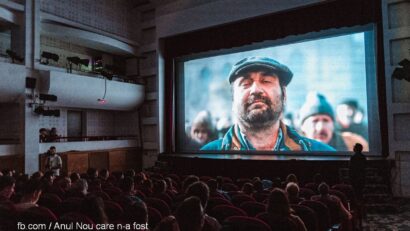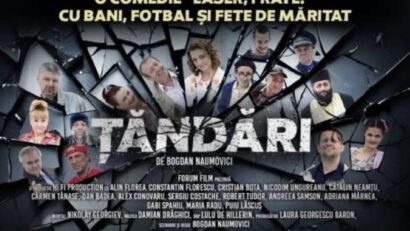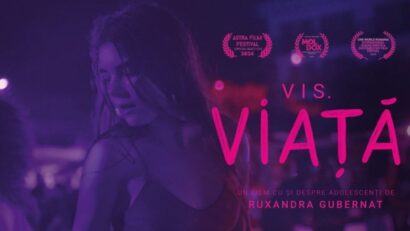The “MicROmânia” International New Theatre Festival
An overview of this year's edition of the festival

Luana Pleşea, 20.05.2017, 12:28
Organised by the “Ioan Slavici” Classical Theatre based in Arad, and now at its fifth edition, the “MicROmânia” International New Theatre Festival this year is focussing on “small Romania, Romania of daily events, Romania of our lives and of our personal/collective bad habits that we face every day”, as the curator of the festival, critic Claudiu Groza says.
“MicROmânia” is the main focus of the festival held between May 6 and 14. New theatre is the theatre which nourishes the dynamics of this art, says Claudiu Groza, speaking about what new theatre means for the Romanian theatre world of the past year:
“Novelty does not necessarily mean fresh staging methods, but rather the fact that the organisers have chosen some texts or staging techniques which bring added value to Romanian theatre. As I come from a sociological area relative to art performance, I have a theory according to which each epoch has its own formula of addressing the public through art. At a certain moment in time it was declamatory theatre, just like 2,000 years ago it was tragedy… Here, in Romania, we have a type of syncretic theatre, which combines visual elements with the text, and where the visual holds pride of place. At the moment, the engine of theatrical art is the social, documentary type of theatre, deeply rooted in reality, in what is happening right now. Everything is driven forward by these searches. What has brought immense joy to me in the past five years is that a public very loyal to the New Theatre festival has crystallised in Arad, a public which grew mature concurrently with the festival and which has always given an honest feedback to us. It is a public that, from a certain moment onwards has started requiring, claiming certain things. They have suggested to me that they wanted to see certain shows, some directors they were interested in and I’ve tried to take into consideration all those preferences.”
One of the shows that have been invited to the New Theatre Festival in Arad was “The Little Prince” by Antoine de Saint-Exupéry, staged by Alexandru Dabija at the Comedy Theatre in Bucharest. Dorina Chiriac, a well known and appreciated actress, impersonates the Little Prince. To Dorina Chiriac, new theatre means self-expression, the moral duty to tell the truth on stage. To her, the novelty in Alexandru Dabija’s directing vision is the attitude.
“He didn’t intend to break clichés, he just wanted to tell honestly and directly the story of the Little Prince and to address children directly, without offending their intelligence. He didn’t address them as if he was addressing some people below our level of understanding, but he treated them as beings with a potential, some intelligent people who are at a certain stage of their evolution on this planet. So, he chose to have an honest dialogue with them. Naturally, he doubled the elements of this discourse with all tiny elements that make up the image of Mircea Cantor, whom he didn’t choose by chance. This is the first time Mircea Cantor is actually collaborating with a theatre. We managed to achieve something beautiful, as we had a magic encounter. We hope this will be also noticed by the audience in the theatre hall.”
One of the shows selected to the MicROmânia focus was “Four little political plays about enemies”, a new text written by Székely Csab, an author of Hungarian expression, especially for the actors of the “Liviu Rebreanu” Company of the National Theatre in Targu Mures. Seen as the most visible playwright of the past five years in the Romanian theatre world, he wrote four fables about power, coexistence, fear, truth and lies, issues of topical interest nowadays. To Csaba Ciugulitu, one of the actors cast in the show, new theatre is best characterised by this topicality of the themes that are being approached. It also deals with another aspect, the discrimination against the different ones, and he somehow identifies himself with the characters.
“I also have a different, atypical face… And I am also less self-conscious. When we first met, many of my younger theatre colleagues looked at me as if they were asking themselves ‘Who’s this? How to start a dialogue with him? Is he tough?”. No. I’m a very friendly person. I have a family, two children. It is true that at first it was very difficult for me to go to the kindergarten to take my kids home, because the other parents looked intensely at me, I was also afraid that some of the kids would start crying when seeing my face. When I was a student in Bucharest, I was known as the Hungarian guy. In Miercurea Ciuc, which is home to a large ethnic Hungarian community and where I worked for the Hungarian Theatre for seven years, I was known as the Romanian guy. My father was born in Arges County, my mother in Gheorgheni, so I am half Romanian, half Hungarian. I speak both languages, and I play for both troupes in Targu Mures…When people get to know me, they also discover my soul. And many say it is a kind soul.”
Six shows have been invited to the festival, under the MicROmânia umbrella. “Life stories, parodies, friendly teasing, painful or deeply touching stories as well as parables of our existence”, these are the highlights, according to Claudiu Groza, who underlines that sometimes fiction precedes reality, as was the case of the show “Four little political plays about enemies”…
“It is very interesting to see how a show created in November 2016 and which was performed during the festival on May 9, was perfectly matching the political and social reality in Romania. Although the show was created ahead of the protest movements staged in spring, ahead of the political scandals that broke out in Romania in early 2017, it left the audience the impression that it was purposefully created for the day when it was performed, May 9. It was actually making reference to intolerance, homophobia, political hypocrisy, deceit and scheming by those in power against the people they should represent. All of a sudden, it looked like a report-show. This MicROmânia reality that we’ve tried to represent in the shows performed during the festival proves, through fiction and art, that reality seems to take shape based on fictional patterns and aesthetic forecasts”. (translated by D. Vijeu)






























